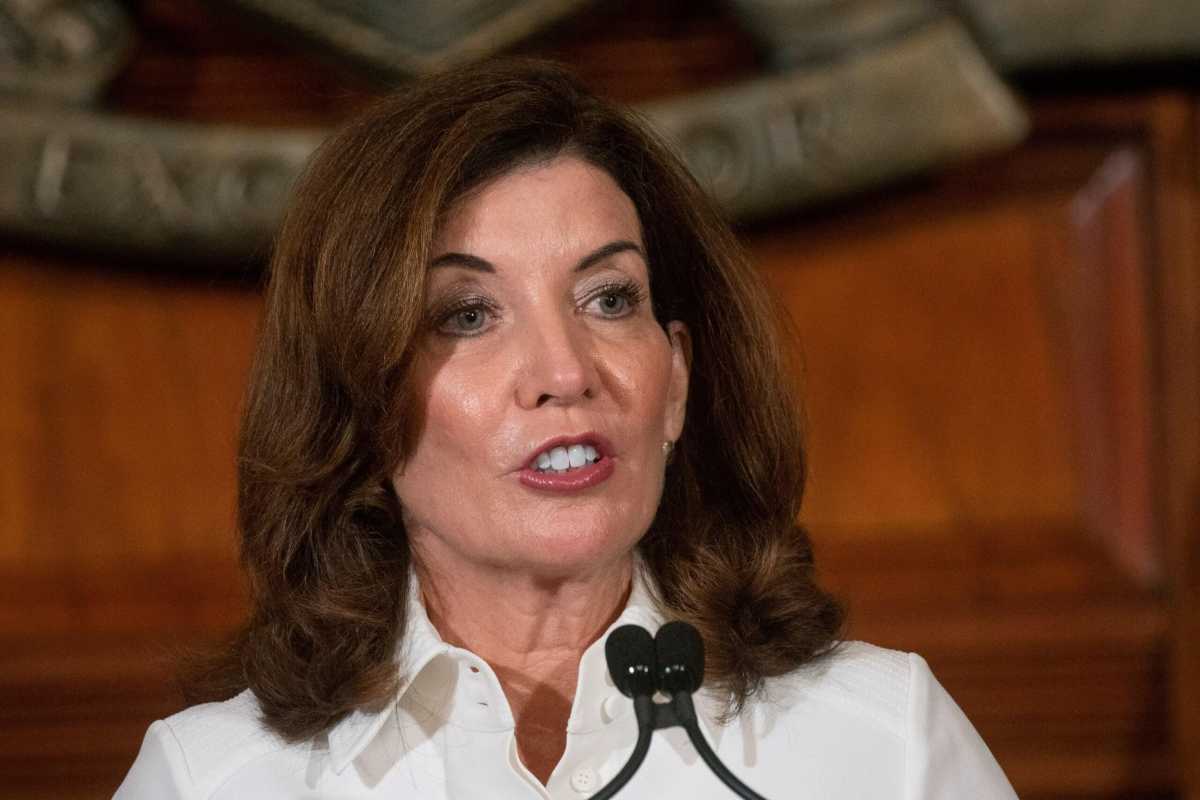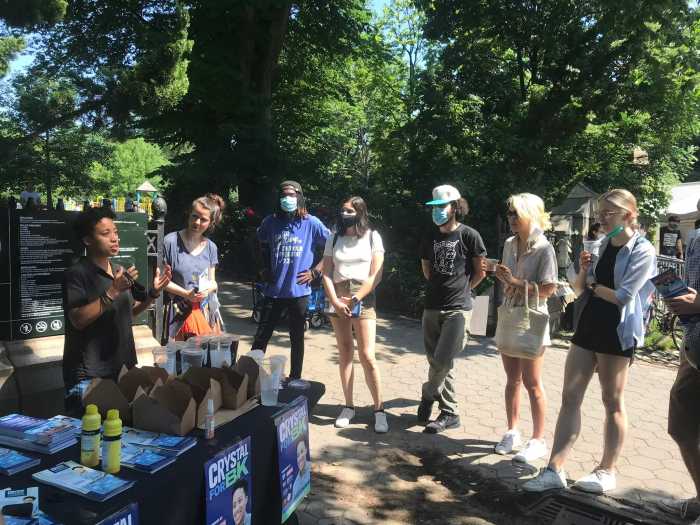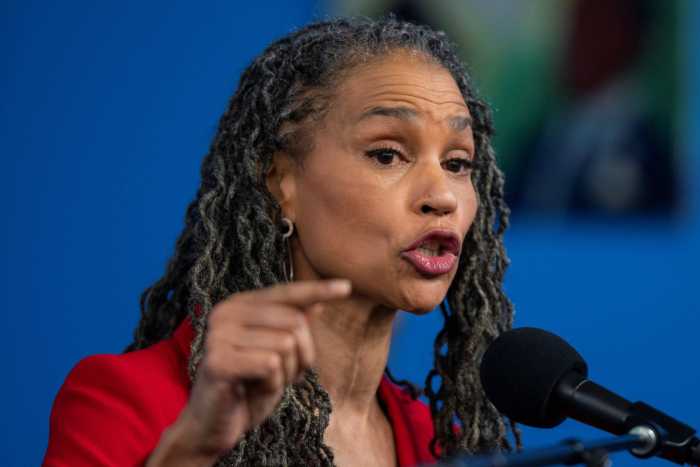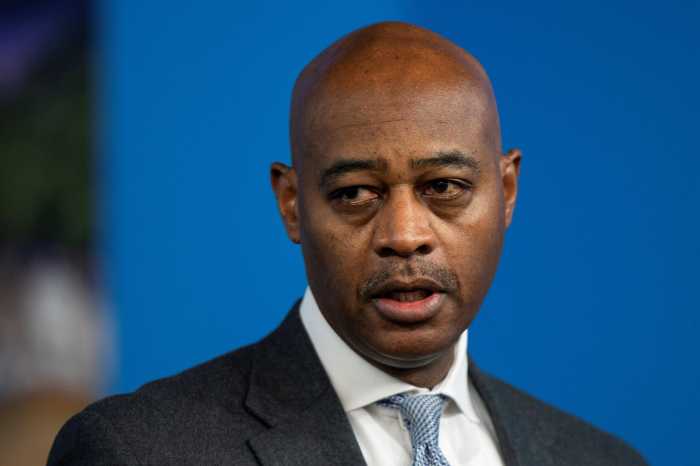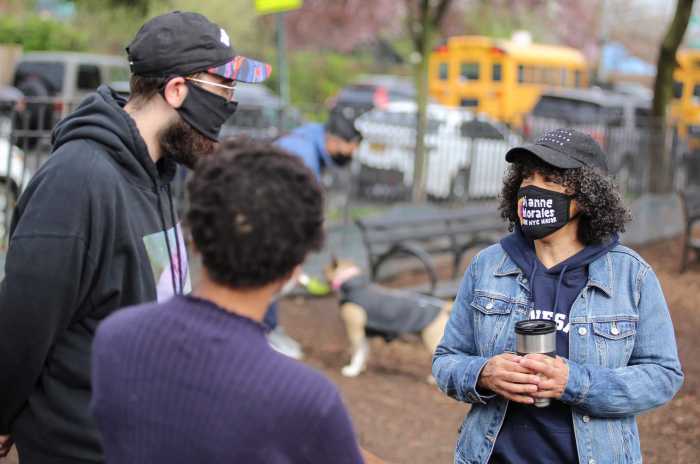LGBTQ leaders and out state lawmakers are outlining their expectations for Governor Kathy Hochul as she settles into her new position as New York’s 57th governor — and much of the focus is on queer youth.
Hochul — the first woman to serve as the state’s governor — sought to swiftly mark the dawn of a new era after she took office on August 24 following the resignation of disgraced ex-governor Andrew Cuomo. Donning white in a nod to the women’s suffrage movement, the former lieutenant governor held a ceremonial swearing-in ceremony and vowed to stand up for individuals in the workplace, from women to “members of the LGBTQ community who often feel they’ve been preyed upon by others.”
Hochul also took to Twitter on the same day to acknowledge the 76th birthday of the late trans icon Marsha P. Johnson, writing, “May we continue to honor her legacy by ensuring full equality & justice for all LGBTQ New Yorkers.”
The newly minted governor has her work cut out for her in her quest to carry out that goal. Hochul is entering office during a busy year for LGBTQ rights initiatives in the state, but the work is far from finished. Most notably, the Gender Recognition Act, signed into law in June, gave New Yorkers the ability to update state IDs and birth certificates with an “x” gender designation, and the state also repealed a discriminatory loitering law described as a ban on “walking while trans.”
However, a series of LGBTQ-related initiatives never made it full circle, including the Survivors of Trafficking Attaining Relief Together (START) Act, which is aimed at vacating convictions for sex trafficking victims. That measure passed both houses of the State Legislature, but the governor never signed it. Another unfinished legislative effort, led by out gay State Senator Jabari Brisport of Brooklyn, would implement a pilot program to provide supportive services and cash payments to homeless or runaway youth — a population that is disproportionately represented by LGBTQ individuals. That bill has yet to clear the State Assembly after passing the State Senate.
Out gay State Assemblymember Daniel O’Donnell of Manhattan, who spearheaded the Gender Recognition Act in the lower chamber and was a leader the effort to pass marriage equality, told Gay City News he is confident that Hochul will be supportive of the community’s needs once she gets established into her role. But he also made it clear that he expects Hochul to address “an explosion of suicide among LGBTQ youth” and ramp up funding for The Dignity for All Students Act, an anti-bullying bill that passed years ago but has yet to get sufficient financial backing from the executive branch.
“The problem is that New York State never attached money to that bill, which has proven to be a great difficulty,” O’Donnell said. “We need to fund Dignity by having a governor or employee of the State Department to make sure that reports are coming in, make sure data is there, and provide assistance for local agencies. We regularly hear that school districts are ignored.”
O’Donnell’s colleague, out lesbian Assemblymember Deborah Glick of Manhattan, also gave the new governor a vote of confidence, describing her as a “smart, steely, and compassionate” leader. Glick echoed O’Donnell’s emphasis on assisting queer youth.
“For me, we are still doing too little to help young LGBTQ New Yorkers who face uncertain futures when their families reject them,” Glick told Gay City News. “Issues of homelessness, and barriers to education, job training, or jobs need our collective energy.”
Brisport recalled meeting Hochul for the first time when he toured Stonewall House, an LGBTQ-friendly affordable housing residence for seniors in Fort Greene, Brooklyn, which is in his district. Brisport offered a broader outlook on the new governor, explaining that the LGBTQ community would greatly benefit from the implementation of universal healthcare — especially during a global pandemic — and he urged his colleagues to advance Brooklyn State Senator Julia Salazar’s legislation to ban many landlords from evicting tenants without “good cause.”
“If [Hochul] really wants to make a marked difference from the previous governor, she will need to be fighting for everyday working class New Yorkers and not just a handful of billionaires,” Brisport said in a phone interview.
Outside of the five boroughs, the LGBTQ community hopes that a governor who hails from Buffalo will bring a statewide perspective to queer issues. Out gay State Assemblymember Harry Bronson, whose district includes Rochester, said he wants the governor to boost funding for runaway and homeless youth as well as for health and human services in the state. LGBTQ-owned businesses, he said, need to be able to access state contracts, and he called for passage of his legislation — alongside out gay State Senator Brad Hoylman of Manhattan — that would establish a long-term care facility residents’ bill of rights for LGBTQ folks.
One of Bronson’s longer-term goals is to ensure long-lasting support of the 340B program, under which drug companies participating in Medicaid are required to sell discounted drugs to managed care providers. That program allows community-based health providers to instead spend that money on other services.
Local health centers sounded alarms when the state was considering overhauling the 340B program several months ago, but the state wound up delaying those changes for at least another year.
“The past governor tried to strip that program a number of times,” said Bronson, who emphasized the impact of the 340B program on health centers in his district. “We have been able to avoid that, but this past year we only got a one-year extension. We have to work hard to make sure the new governor does not try to attack that program under the guise of saving money.”
Housing Works, which serves New Yorkers living with HIV/AIDS and experiencing homelessness, was one of the main organizations fighting against changes to the 340B program earlier this year. After Hochul took office, Housing Works wasted no time in placing pressure on the new governor for a different issue by delivering her a letter calling for the authorization of a pilot program that would establish five overdose prevention centers in the state — four in New York City and one in Ithaca. That effort is intended to allow individuals to safely consume drugs in a more controlled and clean environment.
Charles King, Housing Works’ out gay CEO, stressed that Housing Works hopes to see the governor prioritize housing access for families and provide funding for the state’s blueprint to end the AIDS epidemic.
“We need to come up with better system of care to move homeless people quickly into permanent housing,” said King, who cited the disproportionate number of homeless people who are LGBTQ and people of color. “I think that is an absolute crisis, especially here in New York City, but also in other parts of the state.”
Statewide LGBTQ advocacy groups are also outlining their wish lists for the state’s new leader. The New Pride Agenda, which emerged in 2019, is looking for Hochul to prioritize economic prosperity by boosting access to gainful employment, establishing age-appropriate comprehensive sex education, and working to fully decriminalize consensual sex work.
The organization’s executive director, Elisa Crespo, told Gay City News that the governor’s focus should be on vulnerable individuals, especially Black and Brown trans and gender non-conforming New Yorkers. While the state finally repealed the ban on “walking while trans,” other bills — including the START Act and a comprehensive sex work decriminalization measure — have yet to pass.
“We need lawmakers to understand that human trafficking and sex work are separate and independent of each other,” Crespo explained. “One is about coercion while the other is about consensual labor, survival, and bodily autonomy. New Pride Agenda looks forward to working with the Governor to establish targeted, solution-oriented policies for marginalized LGBTQ people.”
Equality New York, another statewide LGBTQ organization, said the group’s goal in the next legislative session is to advance a measure intended to end inhumane treatment of TGNCBI incarcerated individuals as well as another bill to codify anti-discrimination protections in schools.
“The governor’s support will be crucial to passage and we have confidence that she will be a partner in these efforts,” said Equality New York’s executive director, Amanda Babine.
The Stonewall Democratic Club of New York City, a citywide political club, endorsed Hochul in the 2018 primary campaign for lieutenant governor against Jumaane Williams. The club’s president, Rose Christ, expressed optimism as she looked ahead to Hochul’s tenure as governor.
“We are excited that Governor Hochul is prioritizing housing assistance and the excluded workers fund, both programs that will directly impact the lives of LGBTQ+ New Yorkers disproportionately affected by COVID-19,” Christ said in a written statement. “Looking ahead, we are eager to continue to work with Governor Hochul to advance legislation, policies and programs that support the needs of LGBTQ+ New Yorkers.”
Hochul’s work on LGBTQ issues will be shaped in part by the makeup of her staff in the months ahead. Matthew McMorrow, who served as the director of LGBTQ affairs under Cuomo, is remaining in his role for at least the time being. A spokesperson for the governor told Gay City News that there will be a 45-day window during which Hochul will keep staff from the previous administration.
“This time period will provide her and the transition team with the opportunity to meet with everyone and make any future determinations regarding positions and staffing,” Hochul spokesperson Hazel Crampton-Hays said in a written statement.

